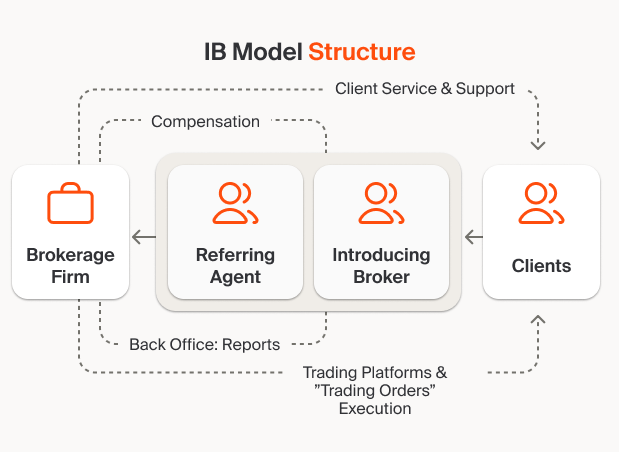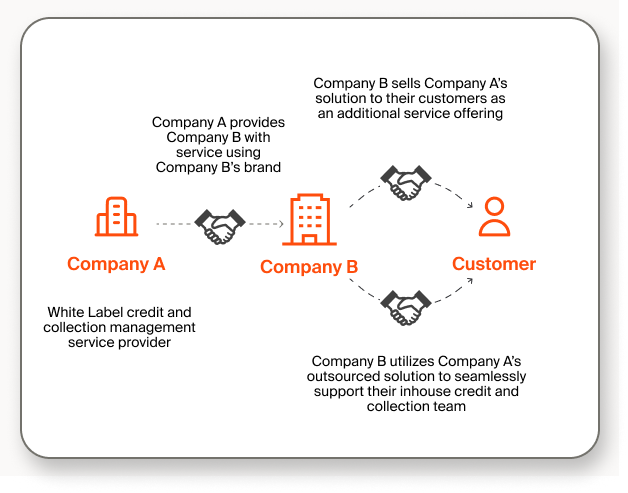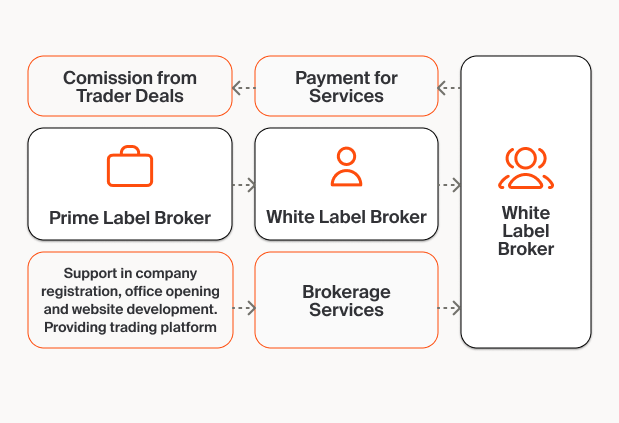Brokerage Business
9 minutes read
Aug 7, 2024
What is White Label Brokerage and How Does it Work?
When running a newcomer brokerage company, business owners have two paths to pave. They either start a firm from scratch or get a White Label solution. What are the core differences between those models and why is the WL brokerage model understood as the best possible solution for the niche pioneers?
Different Brokerage Models
Financial markets unlock access to trillion-dollar capital flows; which is why a brokerage business always keeps up with the times offering its owners multiple opportunities.
As for a brokerage model, one may choose the following solutions: IB (introducing broker), starting a company from scratch, or running a business through the White Label model. Let’s understand the core differences between the mentioned formats.
IB (Introducing Broker)
The IB model cannot be regarded as your own brokerage company – the main role of such a company lies in attracting new clients to a brokerage platform you partner with. That sounds more like an affiliate program type than a business.

Introducing brokers place banners, lending pages, and other promo materials, send email newsletters to persuade clients to sign up for a partnering platform. What do they get in return? Primary brokers provide IBs with rewards through one of the following models: CPA (fixed rewards paid for certain actions of a referral) and RevShare (a certain part of a primary broker’s net profit generated from referrals).
Hence, the Introducing Broker is not your own brokerage company. Marketers promote a primary broker and get rewards.
Running a Brokerage Company from Scratch
When you are going to enter the niche completely on your own, the following stages are mandatory:
- Brand planning.
- Company foundation and licensing.
- Website and trading platform building.
- Partnering with liquidity providers and payment gateways.
- Promotion and marketing campaigns.
At first glance, everything seems to be logical and simple; meanwhile, every step consists of tons of pitfalls.
Newcomer brokers spend much time, money, and effort to take a company public. The overall expenses vary from $100,000 to $500,000. What’s even more important – the niche doesn’t forgive mistakes; which is why not taking into account some important issues leads to wasting a business owner’s costs.
White Label Solution as the Golden Middle
Let’s check the two previous brokerage models once more. The Introducing Broker format is the easiest one as a business owner is responsible for attracting new clients only. Running a firm from scratch means that an owner will shoulder all the stages, pitfalls, and nuances that may be too difficult for beginners.
And now there is a model that stands in between the two previously mentioned models. On the one hand, a business owner gets his own brokerage company. On the other hand, a team of experts helps newcomers avoid difficulties and pitfalls, and save much time, costs, and effort. Let’s dive deeper into the notion of White Label brokerage to understand what are the main pros and cons of the model.
What is a White Label Product in a Broad Sense?
First and foremost, you need to understand what a White Label model is and why it is gaining popularity in the business scope.
White Label is understood as the outsourcing model when one company is responsible for product creation and another company sells it under its own brand. Each party has a set of obligations and responsibilities. White Label is among the best decisions for companies that are eager to expand their services to new markets, increase the loyalty of their clients, and improve the manufacturing speed; meanwhile, those companies lack the necessary resources to achieve the mentioned goals.

As such, White Label solutions act as helping hands for businesses that want to develop but cannot rely just on their own strengths. Due to the WL model businesses increase the quality of their services, enter new niches, and build brand-new products.
Such a model turns out to be effective enough for newcomer business owners who are going to enter the brokerage market.
What Does the White Label Model Mean for Brokerage Companies?
White Label brokerage is a model that provides a beginner business owner with everything he needs to enter the market.
Newcomers get:
- Trading platform. A Prime Label broker unlocks access to industry-leading trading terminals that combine ultimate functionality with ease of use.
- High-end software. Prime Label brokers are ready to give everything their partners need to manage their businesses effectively.
- Liquidity. Orders of your clients will be executed at the best market prices.
- Support. The White Label brokerage model includes high-class support on every level.
In simple terms, White Label brokerage means that you get a ready-made brokerage company powered by a Prime Label broker. Beginners don’t need to think about preparatory steps like company registration, licensing, website building, etc.
When compared to the Introducing Broker model, White Label helps business owners avoid most pitfalls as well, but unlike the IB model, you get your own company to conquer the brokerage market on your own.
Running a company through the White Label model can be compared to buying a franchise. Primer Brokers do everything possible to make the beginning of your journey easy and cloudless.
What are the main pros and cons of such a model?
Pros of White Label Brokerage
- Beginner brokers get everything to run their businesses and save much cost, time, and effort. Business owners do not spend money on licensing, trading platform buying, and other preparatory stages. Hence, the White Label model makes it possible to run a company with some $15-20,000 instead of $100-500,000.
- When running your brokerage company from scratch, it takes you months and even years to enter the market because of a set of preparatory stages. The WL model cuts the process to some 1-2 months.
- Despite the fact that business owners get a ready-made solution, they run a brokerage company under their own brand and then promote it to increase its recognition.
- Prime Label brokers provide their partners with constant high-quality support and assistance that help WL companies find the best business solutions, and avoid dangerous mistakes and difficulties which are common for beginner brokers.
Taking into account the given pros, the White Label model sounds like the only possible option for newcomers; meanwhile, such a model has some weak points as well. What are they?
Cons of White Label Brokerage
- White Label brokers are obliged to pay a Prime Label broker fixed commissions or remuneration based on the overall trading volumes.
- PL brokers do not provide you with any guarantees that the offered trading platform and software completely fulfills the needs and expectations of your target audience. Furthermore, the market undergoes quick changes, and you may face a problem if your Prime Label broker does nothing to keep up with the times.
- The White Label partnership makes a business owner dependent on a Prime Label broker; which is why you cannot initiate some crucial changes on your own. All the steps need to be agreed with a PL broker first.
It’s important to understand that a business owner may not face the given weak points of the White Label brokerage. Everything depends on a Prime Label broker you are going to partner with. The right choice makes your way profitable and cloudless.
Tips on How to Choose a Provider of WL Solutions
At present, multiple companies act as Prime Label brokers offering newcomers the fullest set of services to enter the market. Never make a hasty choice, as the quality of a PL broker affects whether your White Label brokerage company will succeed in the niche or not. Here are some important criteria to take into account when partnering with Prime Label brokers:

- Reputation of a company. Partnering with no names is definitely not a good idea when you are going to build a successful brokerage firm. Choose from Prime Label brokers that are understood as world-known ones.
- Different packages. Top-rated Prime Label brokers usually offer different WL packages, and a business owner pays for what he truly needs.
- Partnering conditions. The more “freedom” you have, the better. High-class providers of WL solutions allow their partners to develop their own brands, setting minimum restrictions.
What Should Be Taken into Account to Partner with a Prime Label Broker
Once you have met a top-rated provider of WL solutions, the following stages are mandatory to build the top-notch partnership.
Decide Which Features You Are Going to Unlock for Your Clients
On the one hand, the more features your clients will get, the better. On the other hand, don’t make a trading platform too complicated for beginners.
Most providers of WL solutions offer MT4 and MT5 trading platforms as those terminals combine ease of use with ultimate functionality. Other platform types are possible as well. Choose an option that is able to meet your clients’ needs and expectations.
Look through the Available Packages
Trustworthy Prime Label brokers offer different packages, and the pricing depends on a set of features business owners want to get. Take into account your budget and select a corresponding package.
Don’t forget that a high-level provider of WL solutions never insists on the most expensive packages. Such companies do not recommend their partners to pay for services they will not benefit from.
Build Your Unique Brand
Once you’ve agreed on technical details, licenses, features, and other nuances, customization of the White Label solution is the final stage. Customize a trading platform to develop your own brand and increase its recognition among the target audience. A provider of the WL solution may help business owners select the right marketing strategies.
Steps-by-Step Guide on How to Run a White Label Brokerage Business
A business owner understands that the WL solution is the best model to enter the brokerage market. What are the next steps?
- Choose a provider of WL solutions who corresponds to all the important criteria.
- Look through the available trading platforms and pricing packages. Compare the conditions to understand which package is the best for your needs and budget.
- Contact a WL provider to get started.
- Agree on features your trading platform will be equipped with.
- Get the demo of a chosen solution to see a product in action and understand whether it meets your expectations.
- Customize your platform to make it truly your own.
- Sign the contract with a WL provider where all the partnering conditions are pointed out.
- Proceed with payment based on the signed contract.
- Get access to your brokerage solution and start developing your own brokerage brand and earn money.
Is White Label the Best Solution to Run a Brokerage Business
Despite all the weak points, including the lack of control over a brand, the White Label model is the best solution for beginners. They get a ready-made company, save much time and funds, and avoid most pitfalls when entering the brokerage market. Furthermore, a business owner who has chosen White Label brokerage gets constant support and maintenance provided by qualified experts.
Many industry-leading brokerage companies started their ways from the White Label model. The most important thing is to select a provider that is experienced enough and offers the very best solution that covers all your needs and expectations.
FAQ
523

Written by Artem Goryushin
Marketing at FintechFuel
Writing about the exciting worlds of iGaming and the brokerage business, breaking down the latest trends and insights. Making complex topics easy to understand, helping readers stay informed and ahead of the curve.
More by authorRead more

Brokerage Business
10 minutes read
Sep 30, 2025
The brokerage industry in 2026 is entering a new phase shaped by technology, regulation and shifting client demands.


